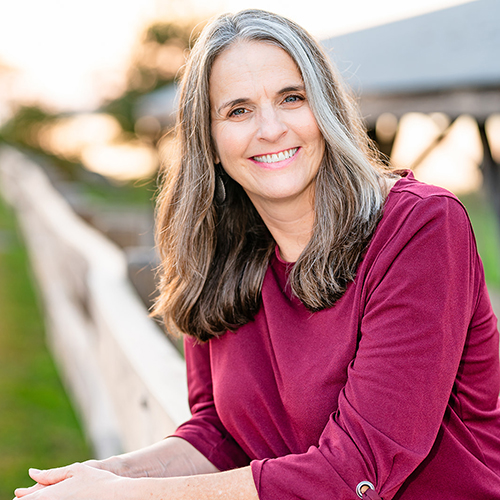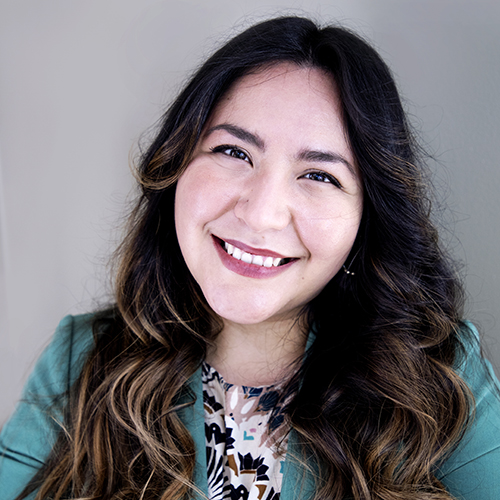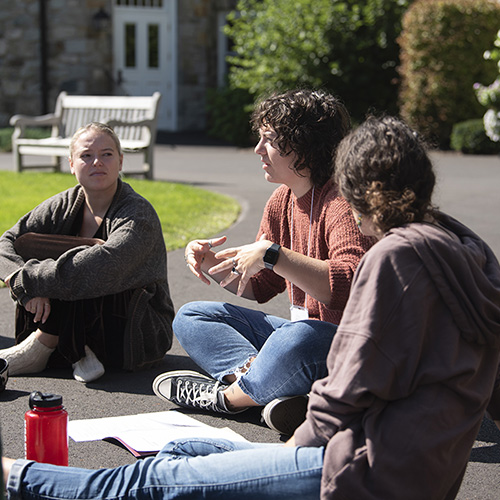
Sheilah M. Gauch, B.A. ‘96, M.S.W. ‘01.
She’s worked with students with complicated mental health needs for more than 20 years. She’s championed the passage of legislation that requires healthcare providers to cover the treatment of sick children in Massachusetts with Pediatric Acute-Onset Neuropsychiatric Syndrome and Pediatric Autoimmune Neuropsychiatric Disorder Associated with Streptococcal Infections, conditions that have been linked to obsessive-compulsive disorder, food restriction, depression, and other behavioral changes after cases of strep and other infections. And she’s blogged for Psychology Today, exploring best practices to help children with complex illnesses heal.
Now Sheilah M. Gauch can add another big accomplishment to her curriculum vitae, having recently been named the winner of Boston College School of Social Work’s 2024 Distinguished Alumni Award for her contributions to the helping profession.
She will be honored for her achievements as part of BCSSW’s annual Equity, Justice, and Inclusion Lecture and Distinguished Alumni Award Celebration on Monday, October 21 at 6 p.m. in the Yawkey Center.
“We need to be talking about mental health conditions rooted in the body because we are missing marginalized populations when we don’t,” says Gauch, B.A. ‘96, M.S.W. ‘01. “I’m hoping my award will open people’s eyes to the fact that there are other tools we can use and we need to lean into them. If we’re to focus on equity, justice, and inclusion, we need to lean into a new understanding of mental health and revolutionize mental health to get people better because people are deserving of healing.”
We asked Gauch to reflect on her path to BC, her experience at the School of Social Work, and how it’s shaped her career choices.
What brought you to Boston College?
I transferred to Boston College from the University of Texas at Austin, where I had been an All-American swimmer. I was at the end of my junior year, and I had an acute onset of depression and anxiety, which led me to leave my sport and make a new path for myself. I landed at BC. It was a really safe place for me and I got to chart a new course for myself and change the trajectory of my life. As I began to heal at BC, I came to lean into the idea that other people deserve to heal, too. I felt like social work was a natural progression for me to lean into that idea—that everyone deserves to heal from mental health struggles.
One of my favorite things about the BC School of Social Work was that it allowed me to gain the clinical tools I needed while also giving me access to the policy piece, even though I practiced in the clinical program. I’m a big systems person, and I still reference my introduction to policy class to this day. I want to create change, and so I really lean into that combination of the clinical and the macro practice routinely, and I feel like that’s really the gift that BC gave me.
Both of your children were diagnosed with Pediatric Acute-Onset Neuropsychiatric Syndrome and Pediatric Autoimmune Neuropsychiatric Disorder Associated with Streptococcal Infections, conditions that have been linked to obsessive-compulsive disorder, food restriction, depression, and other behavioral changes after strep and other infections. How has your work as a mom to help your children overcome these conditions influenced your work as a social worker to help other kids overcome their own challenges?
During my time as a special education school adjustment counselor at Arlington High School, which ran from 2009 to 2017, my own two children had an acute onset of mental health challenges that required significant support. As a result of my experience and my development as a social worker, I felt like I had the tools to help support them. But it didn’t work out that way. They were getting progressively sicker no matter what interventions and treatments we tried. Eventually, both of my children required out of district placements in schools like Dearborn Academy, a therapeutic day school where I currently work as principal and clinical director, because their level of need was so great. And I watched what being removed from their community did to them.
So, when they were really struggling, I went back to school to get a master’s in education, a degree I received in 2017. It became my mission to make sure I had the tools in my toolbox to not only help my own children, but to give back to other children and families that were struggling. Right before I came to Dearborn Academy, I got my license in education and organizational management and I earned my principal’s license.
Around this time, I thought I would likely lose one of my children. The mental health, the obsessive-compulsive disorder, the anxiety, and suicidal ideation had gotten so bad that and I didn’t know what else to do. I was out of tools in my toolbox as a social worker and as a mom. And that’s when another mother mentioned PANDAS. I said, “I don’t know what that is.” So I took one of my children to the doctor and he actually diagnosed that child with PANDAS. Within two to three weeks of being on antibiotics and anti-inflammatories, after all of the treatments—I mean, this was like six years of their life, from age 5 to age 11—I watched OCD abate, I watched suicidality abate in ways that made me question what was happening. I had never in my life as a social worker seen anything like that, so I ran toward it and had my other child screened as well. They also got diagnosed and started to get treatment, and both of them healed in ways that were so stunning to me, and I realized I had just been given a puzzle piece that I needed to understand more about. I needed to understand more about how the body impacts the brain, because if this diagnosis was missed in my children, it was likely missed in other kids as well.
When I landed at Dearborn Academy, I wanted to make sure that what happened to my children did not happen to other children. I told my supervisor that I’d really like to lead some legislation at the state level and she said “great.” And I said I’d really like to be the chair of my local special education parent advisory council and she said “great.” So I started on this dual path—where one side is my professional career and the other side is some significant advocacy work.
Myself and another woman, Jennifer McCormack Vitelli, co-founded the Massachusetts Coalition for Pediatric Autoimmune Neuropsychiatric Disorder Associated with Streptococcal Infections/Pediatric Acute-onset Neuropsychiatric Syndrome Legislation. And in the middle of the pandemic, a bunch of parents got legislation passed requiring healthcare providers to cover the treatment of the sickest children in the state. At the same time, we also established a permanent Department of Public Health advisory council for PANDAS/PANS. We have two new pieces of legislation in the works—one is a screening tool and the other is a prevalence study. So we’re asking the Department of Mental Health to go back and look at who they've missed with PANDAS/PANS because my children were the most acute children in their care and I’m curious how they’ve learned from that to help more children. I also co-founded a national level group—the National Alliance of PANS/PANDAS Action—that is pushing the National Institutes of Health to generate more research for the condition.
How has this experience, both as an advocate and a mom caring for two children with PANS/PANDAS, shaped your work at Dearborn Academy?
I’m really focused on understanding caregiver stress and trauma. I think there’s a unique trauma that comes with providing care to children with mental health issues that we don’t talk about. In my role as clinical director, we’ve really built up our caregiver support in a unique way, offering a 10-week trauma program for caregivers. What we realized is that if we want to help the students in our care, we need to help the parents as well.
What’s the most challenging part of your work at Dearborn Academy?
I think the most challenging part of my work is helping students build the skills that they need to move to a less restrictive setting. But what we’re finding is that that can be particularly difficult with students who have significant disabilities. At one time, many members of my clinical team were coming to me and saying, “Gosh, Sheilah, this doesn’t look like the right diagnosis. This student was diagnosed with major depression, but it actually looks like anxiety. How do we help these students differently?” So I was using the clinical tools I learned about in social work school and really leaning into getting some diagnostic clarity on what is going on for the students in our care. Because if you don’t have the right diagnosis, you don’t have the right treatment.
So we put together a model of support, which we call our diagnostic consult model. We leaned into using empirical evidence and diagnostic screening tools for students who were not finding success in getting healing like they deserve. And we brought in a psychiatric nurse practitioner.
What we are finding now is that students are healing. A lot of children who appeared to be treatment-resistant with chronic suicidality are not returning to hospitals once they are getting the correct diagnosis. Some students had medical conditions that had been missed, whether it’s PANS or acute thyroiditis—and they are finally getting the right treatments. We’re in the middle of a mental health crisis. Suicide is the second leading cause of death for people aged 10 to 24. And those suicide numbers are exponentially rising in our Black youth and in other children of color. So we need to make sure that we are turning over every stone. When you talk about medical underpinnings to mental health, we get a lot of pushback around it. It’s confusing to me because there’s enough research and science to back it up. But we’re all going to be brave and do hard things to make sure that children can find healing, can access academics, and then can move on to their less restrictive setting.
All of my work is informed by the idea that all people are worthy of healing. And if a treatment isn’t working, we as professionals need to figure out the next treatment. What can we do differently? How do we have intellectual curiosity? How can we develop the intellectual humility to realize that we may not know everything and there might be something else out there that could help?
The theme of BCSSW’s Equity, Justice, and Inclusion lecture this year is “Contemplation in Formation.” It is also the new theme of the School’s EJI Initiative, which is calling on students to spend time in self-reflection to look within, make sense of their experiences, and identify their deepest desires. How did formative education—a guided process that helps students find purpose, live fulfilling lives, and understand the world around them—factor into your experience at BCSSW?
We have two active research studies going at Dearborn. I’m not a researcher, but I learned at BC that it’s important to keep growing, to keep reflecting on who you are and on your practice. And if you need to step outside your comfort zone to help more people, that’s what you do. And you learn new things. Through our studies, we are looking to figure out how to share what we are learning about students and children who aren’t making progress, either mental health wise or academically, and how leaning into diagnostic clarity actually helps them heal. We want to give that to the world. Everything I do in my practice is to figure out how to change systems so that more children can heal.
Is there anything else you would like to add?
We need to be talking about mental health conditions rooted in the body because we are missing marginalized populations when we don’t. We need to lean into all the tools in our toolbox and be willing and brave to step out of what we know and learn new things. I’m hoping my award will open people’s eyes to the fact that there are other tools we can use and we need to lean into them. If we’re to focus on equity, justice, and inclusion, we need to know what the numbers are and lean into a new understanding of mental health and revolutionize mental health to get people better because people are deserving of healing.




